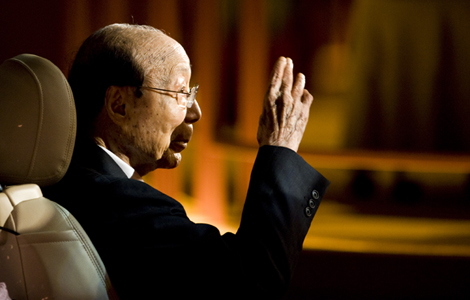Proposed pension reform divides opinion
Updated: 2014-01-09 13:34
(Xinhua)
|
|||||||||||
BEIJING - Proposed reforms to the pension plan for China's civil servants has grabbed public attention and divided opinion.
The public is critical that government officials do not need to input into the country's pension pool but will enjoy higher annuities after retirement than their peers from enterprises and farming due to different plans.
China adopts different pension plans for enterprise employees, rural residents, urban dwellers and workers with government and government-sponsored institutions. This has caused a gap in pension payments, Zheng Gongcheng, a professor with Renmin University of China, told the People's Daily, flagship newspaper of the Communist Party of China (CPC).
The lack of a uniformed and centralized pension system has led to imbalanced payments in different regions, Zheng said.
The divergence has impaired the fairness and sustainability of the country's pension system, the professor said.
According to a key decision by the CPC published last year, the pension system for government and public institution employees will be reformed.
Civil servants should pay their share into the pension pool as other citizens do, wrote Internet user "tanglamanque" on Sina Weibo, China's Twitter.
"Civil servants should not be a privileged group. They are entitled to equal rights as other citizens but should also perform equal duty without exception," said Weibo user "huchengxueshi".
However, a proposed change to tally officials' pension with other citizens' plans has also led to dissatisfaction, especially from grassroots public servants.
Compared with their peers in enterprises, public servants' in-service wage is generally lower and they are bearing no less pressure, said netizen "wodemingzijiaoshishier", indicating that a higher pension after retirement will be a proper remuneration.
In an article by Shang Yang and published in Wednesday's edition of the People's Daily, the author said an indiscriminate pension plan to address the current imbalance may give rise to more unfairness against public servants.
According to Zheng, efforts to end the imparity in plans among public servants and ordinary people will be an inevitable move in the country's pension reform.
In a pilot program featuring similar pension arrangements for retired officials with other people in the southern city of Shenzhen in Guangdong province, civil servants are required to pay their own premiums for future annuities.
"For me, being a public servant is only an option in my career path, and a uniformed pension system will make it easier for me to change my job in the future as I will not have to worry about my previous pension deposit," said a public servant surnamed Yang in Shenzhen.
Related Stories
China boosts pensions for corporate retirees 2014-01-08 23:36
Survey reveals opposition to pension reform 2013-12-12 18:49
Higher retirement age may help solve pension problem 2013-10-23 00:59
Chinese citizens speak out on pension issues 2013-10-21 16:29
Reform of pension system 'faces challenges' 2013-09-27 15:35
Today's Top News
New ambassador to the EU takes up reins
Top court seeks judicial transparency
China has most outbound tourists
Turkey removes police chiefs amid graft probe
Four feared dead in British helicopter crash
Tokyo urged to end militarism
Russia imposes security clampdown in Sochi
Chinese developer inks London deal
Hot Topics
Lunar probe , China growth forecasts, Emission rules get tougher, China seen through 'colored lens', International board,
Editor's Picks

|

|

|

|

|

|





